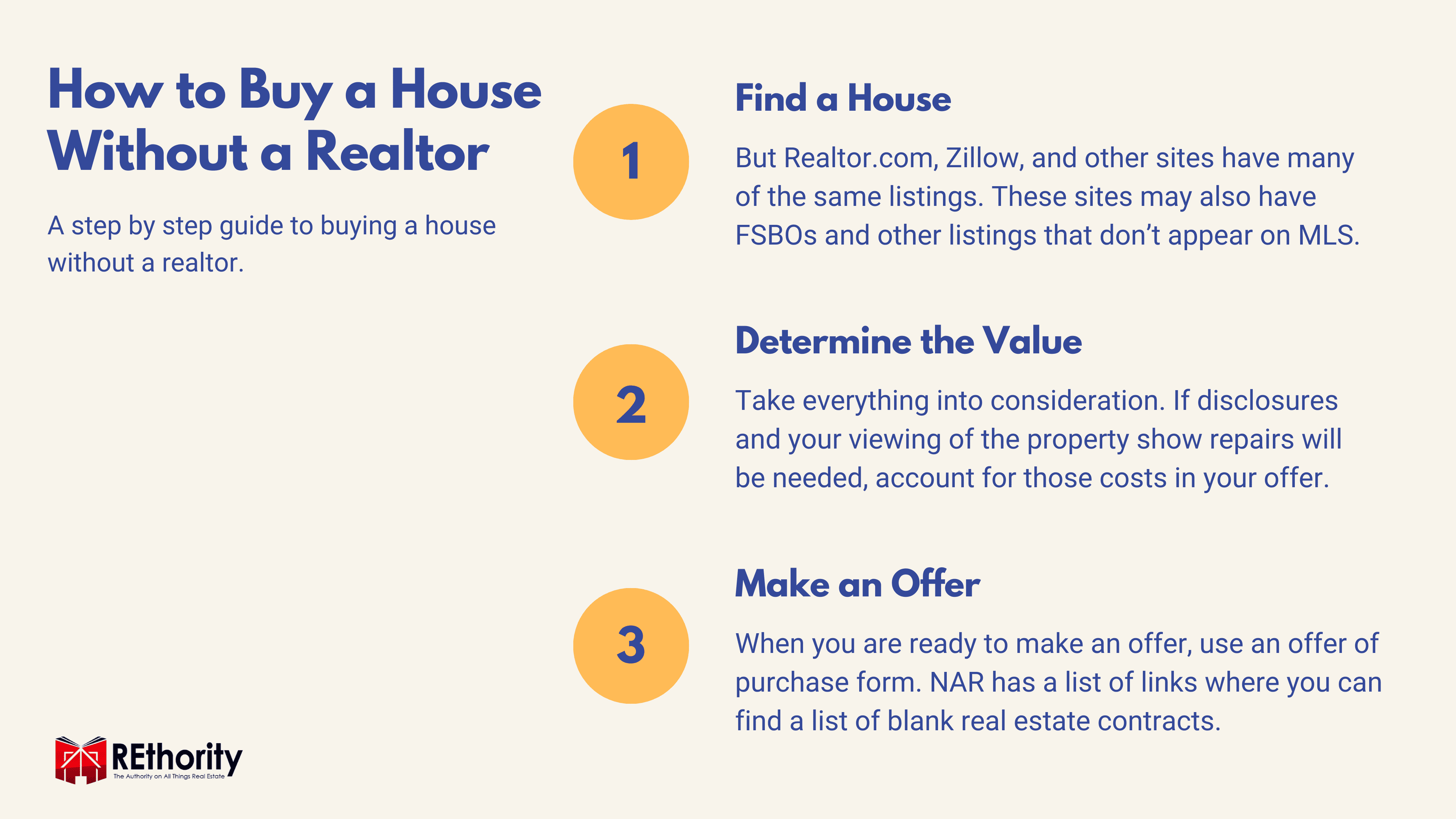If you’re wondering how to buy a house without a realtor, you’re in the right place.
Our complete guide covers everything you need to know. Read on to learn more.
How to Buy a House Without a Realtor
It’s entirely possible to buy a home without using a realtor. While it is not without potential risk, this approach can save thousands in agent’s commissions for experienced real estate investors.
Eighty-nine percent of home buyers go through an agent or broker, according to the 2019 Profile of Home Buyers and Sellers.
Another 5 percent bought directly from a builder or builder’s agent, according to the survey by the National Association of Realtors.
This means that only 6 percent of buyers didn’t use an agent. However, the actual number may be higher. NAR, after all, is a trade association dedicated to promoting the interests of real estate agents.

And the NAR survey indicates agents are becoming less critical about finding a home. The internet has replaced agents as the primary way buyers find the homes they ultimately purchase.
Today, 52 percent of recent buyers find homes to buy by searching online. That’s up from 8 percent in 2001. With the rise of IDX websites and Zillow, it’s become easier than ever to search for homes from your couch.
Agents, who used to be the leading way to find a home, are now second. Referrals from yard signs, relatives, neighbors, friends, and builders have also declined as the internet has taken over.
Benefits of Buying Without Agents

Serhii Krot/Shutterstock
There are significant potential benefits to home buying without an agent. Real estate investors may want to consider buying without an agent for these reasons:
- Cost Savings. Typical agent commissions are 3 percent each for the buyer’s and seller’s agents. On a $200,000 home purchase, that’s $12,000 in commissions. The seller usually pays closing costs, including commissions. But if there are no agents or only one agent to pay, the seller may accept a lower price.
- Access to FSBO Sellers. Some FSBO home sellers may refuse to deal with buyers represented by agents. They don’t want to pay the buyer’s agent commission, which can top 3 percent.
- Avoid Bidding Wars. If neither buyer nor seller uses an agent, it’s unlikely that the property will be listed on the local MLS. So other buyers are less likely to submit competitive bids.
- More Control. NAR has nearly 1.4 million members, all who show a wide range of abilities. Some are dedicated, experienced experts. Others are inexperienced, inattentive, and likely to botch a transaction.
Risks of Buying Without an Agent

Ampcool/Shutterstock
While the benefits of buying without an agent are real, the potential risks have to be considered. There are several ways a real estate purchase without an agent can go wrong.
- Overpaying. One of the most significant risks is paying more than the property is worth. An agent’s knowledge of the local market can keep you from offering too much.
- Undisclosed Problems. An agent’s experience may help reveal property issues such as drainage or repair problems that you might miss.
- Paperwork Snafus. Templates and instructions for contracts and other documents can be found online. But an agent’s knowledge of what and when to submit them can be useful.
- Too Much Time. It takes time to search for property, craft offers, negotiate with sellers, and prepare for closings. If your time is highly valuable, it may be more cost-effective to outsource these jobs to an agent.
- Difficulty Negotiating. A buyer will often be more emotionally invested than a third party, such as an agent. An agent may be better positioned to evaluate aggressive counteroffers calmly.
- Objectivity. Agents may be better at handling seller questions about potentially inflammatory topics such as your financial ability to do the deal.
How to Buy Without an Agent

Jeffy11390/Shutterstock
The home-buying process without an agent starts like buying with an agent. That is, by contacting a mortgage lender to see how much you can borrow, you’ll get an idea of your price point.
When you have your pre-approval, you are ready to look for properties. Locating properties can be done using the internet. The local Multiple Listing Service may not be available without a member agent’s involvement.
Find a Home
But Realtor.com, Zillow, and other sites have many of the same listings. These sites may also have FSBOs and other listings that don’t appear on the MLS.
Contact Owners
Once you’ve identified likely homes, contact owners or listing agents about seeing them. You won’t have a realtor’s access to electronic lockboxes.
So you’ll have to arrange to meet owners or listing agents at the property to get access. You can determine the home’s fair market value by checking sale prices for similar listings, if available.
Determine Value
Sale prices are not public in all jurisdictions, however. Listing prices are not as reliable as sale prices. Regardless, they still give an idea of value.
Before making an offer on an attractive property, request a copy of the seller’s disclosures. If disclosures and your viewing of the property show repairs will be needed, account for those costs in your offer.
Make an Offer
When you are ready to make an offer, use an offer of purchase form. NAR has a list of links to state real estate departments where you may be able to find blank contracts.
US Legal Forms can supply state-specific real estate forms as well. Arrange in advance with a lawyer or title company to hold your check for earnest money. This ranges from a few hundred dollars to 3 percent of the sale price.
Give a Deposit
The amount varies by market. Submit the earnest money with your offer. Always specify that the offer is contingent on the home being inspected by a home inspector.
If the seller counters with a higher price, you can use these negotiation points:
- Offer to ignore repairs indicated as necessary by the home inspection.
- Offer to exclude appliances, furniture, and other items from your price.
- Offer to change the closing date to one more convenient to the seller.
- Offer to change the move-in date to one the seller prefers.
- If the seller wants to stay after closing, offer to lease the property back at a reasonable rate.
Order an Appraisal
Your lender will require an appraisal to ensure it’s not lending more than the house’s worth. You may need to get that scheduled. You’ll also need to give the title company time to conduct a title search and issue a title insurance policy.
Make sure to ask for and receive other relevant paperwork, such as condominium or homeowner’s association bylaws.
Close on the Home
When closing time arrives, you can hire a real estate attorney to represent you. In some jurisdictions, you can represent yourself without an attorney.
The title company and the seller’s agent all have a vested interest in seeing that documents are prepared and submitted correctly and accurately.
One or the other should be able to help you with answers and assistance on many matters. However, to be sure everything is done correctly, consider retaining a real estate attorney to review the paperwork before closing.
Who Should Buy a House Without an Agent
Not every investor is suited to buying without an agent. Most buyers who don’t use an agent have some of these characteristics:
- Have prior personal experience with the process of purchasing several homes using agents.
- Are buying from a trusted friend or family member.
- Already know the home they want to buy.
- Have confidence in their ability to manage the process.
- Have access to expert advice from an attorney or other sources.
- Want or need to save money by not paying agent commissions?
So, Should You Buy a House Without an Agent?
Buying without an agent takes more work than buying with an agent. And it can expose you to more potential risks of things going wrong.
But if you need or want to save a lot on agent commissions, it may be right for you.

